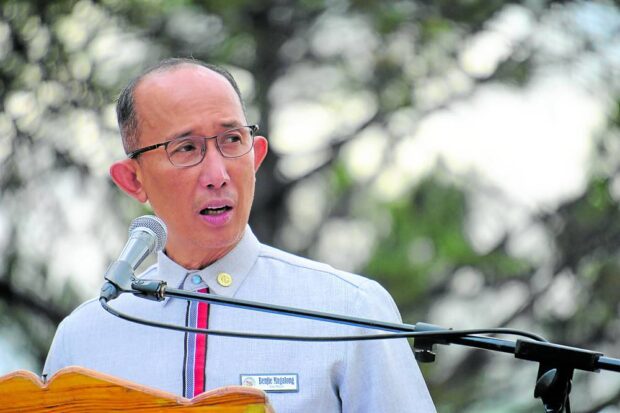
Baguio City Mayor Benjamin Magalong INQUIRER file photo / NEIL CLARK ONGCHANGCO
BAGUIO CITY — Mayor Benjamin Magalong on Thursday urged the Bases Conversion and Development Authority (BCDA) to exclude the entire cluster of barangays thriving inside Camp John Hay and turn over all open spaces, including roads, schools and public buildings within the territory of these villages, to the city government.
“Categorically, I say I am in support of the total segregation of [barangays located inside Camp John Hay],” the mayor said at a briefing, arguing that the BCDA and the national government “have to trust that local governments can manage their own barangays.”
READ: Baguio, BCDA seek talks over Camp John Hay row
Currently, improvements to Camp John Hay barangays require a long process to secure BCDA permission, often at the expense of the quality of life of residents, Magalong said.
Since the BCDA insists it owns all public properties within these barangays such as roads and waterways, the Baguio government is unable to convert these villages into “liveable communities” because its resources have been limited, he said.
Magalong expressed this position two days after residents of Camp John Hay villages demanded more say in a congressional bill that would segregate and sell occupied lands to residents during a public consultation led by the council on Tuesday.
House Bill No. 9428 would convert occupied lands inside 13 Camp John Hay barangays into alienable and disposable lands, allowing the properties to be sold by the BCDA to residents and thereby fulfilling one of 19 conditions set by Baguio in 1994 when it endorsed the commercialization of the former American rest and recreation baseland.
Obligation
The conditions are enumerated in Resolution No. 362 series of 1994. Condition No. 10 grants Baguio a 25-percent share of the rent collected at Camp John Hay. Condition No. 5 requires the BCDA to respect indigenous peoples rights years before Republic Act No. 8371 (Indigenous Peoples Rights Act of 1997) became law although the 1987 Constitution protects IP rights.
Condition No. 14 has obligated the BCDA to exclude 14 barangays located inside Camp John Hay. Former President Gloria Macapagal-Arroyo issued an executive order in 2001 separating Barangay Scout Barrio as a housing settlement but the BCDA retained control of the barangay and released land titles only to homes occupied by Scout Barrio residents.
READ: Baguio council objects to BCDA extension bill
Councilor Peter Fianza, chair of the committee on laws, said the Scout Barrio exercise was not “true segregation” as required by Resolution 362.
HB 9428 would exclude Barangays Happy Hollow (669,140 square meters), Loakan-Apugan (two parcels measuring 1,952 sq m and 1,298 s qm), Loakan-Liwanag (276,416 sq m), Loakan Proper (7,535 sq m), Lucnab (9,185 sq m), Greenwater (54,872 sq m), Upper Dagsian (three lots measuring 16,082 sq m, 1,915 sq m, and 53,379 sq m respectively), Country Club Village (two lots spanning 130,643 sq m and 3,670 sq m), Hillside (17,809 sq m) and Sta. Escolastica Village (3,112 sq m).
Also set for segregation are Barangays Camp 7, Lower Dagsian and Military Cut-Off, but the council’s copy of HB 9428 does not list their technical descriptions.
Profits from the sale would be kept by the BCDA, which participants of the Jan. 16 consultation opposed.
Ancestral land
Sponsored by Baguio Rep. Mark Go, HB 9428 stipulates that “existing roads, alleyways, pathways, creeks or waterways, community facilities including barangay halls, parks, playgrounds, multipurpose areas, such as—but not limited to—marketplaces and social halls shall be transferred to the City Government of Baguio.”
But Camp John Hay barangays are complaining that HB 9428 does not address government-issued Certificates of Ancestral Land Titles and Baguio’s only Certificate of Ancestral Domain Title at Barangay Happy Hallow, which recognize Ibaloy settlements as private lands and are therefore outside BCDA custody.
Fianza advised the 13 barangays to study Proclamation No. 414 which separated 380 hectares in the villages of Loakan-Apugan, Atok Trail and Kias as a mineral reservation in 1956.
This meant that some of the Camp John Hay barangays, possibly including Happy Hallow today, were never under BCDA control “because you cannot be covered by two proclamations,” he said.